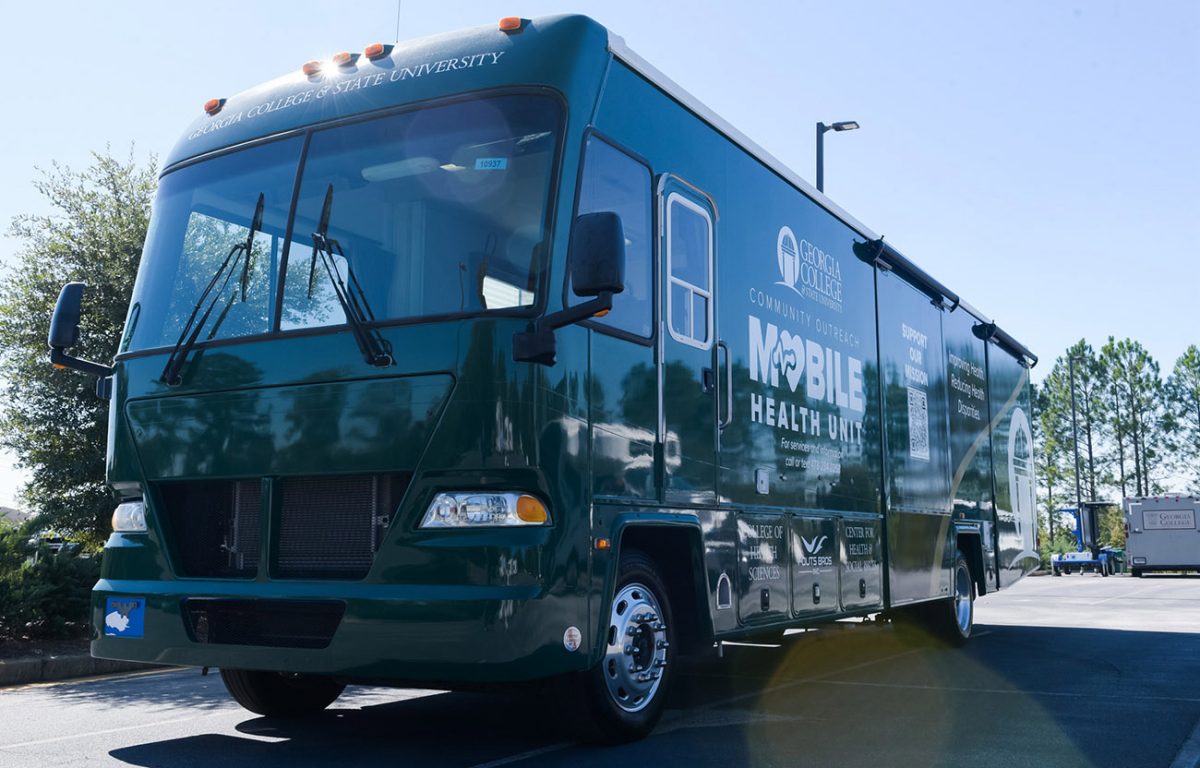In October, GCSU unveiled its new “Mobile Healthcare Unit,” intending to combat the lack of easy access to health care in rural communities in middle Georgia.
The Mobile Healthcare Unit (or MHU) is a 40-foot-long bus that has been transformed into a mobile doctor’s office. Features include three retractable awnings, two medical exam rooms, refrigeration for vaccines and on-site bathrooms. Students and Medical supervisors will be manning the MHU and will provide basic medical care, examination, blood tests, vaccinations and screenings.
Currently, the MHU is scheduled to be at the Putnam County Health Fair and will be shown off to the Georgia health community, allowing for tours and questions with leading administrators.
In a press release on Oct. 22, GCSU President Cathy Cox spoke volumes about the need for the MHU and the impact it will have on nearby communities.
“Our new, state-of-the-art Mobile Health Unit will address a critical need for residents in rural communities,” Cox said “Many of these communities are losing access to healthcare, while simultaneously providing nursing and public health students with the vital training they need to become future healthcare leaders and frontline workers. It is truly a win-win for all involved.”
Cox emphasized the vital use of the MHU and how it will act as a training platform for the university’s nursing and public health students. After finding out about the MHU, GCSU nursing students explore their opinions, and if they would want to work in it.
“I think it’s a good idea and great for the community,” said Lauren McDonald, a sophomore nursing major. “And I would love to have the opportunity to work on it. I think it would be really cool.”
Some students seem to be concerned with how much funds the school should invest into local communities, arguing that these funds would be better allocated for student needs on campus.
“It’s an amazing idea,” said Cade Steel, a junior history major. “But It also looks pretty expensive I think.”
Several students and faculty believe that this is a great investment of school funds and a very beneficial addition to the College of Health Sciences’ public health program.
“I don’t think it should be one over the other,” McDonald said. “I do think it’s a good thing to invest in the community, maybe more so than the school.”
The MHU fills many different roles, acting as a training center and a mobile examination and vaccination station. With primarily students manning the unit, some are concerned about the inexperience of students. However, the bus will be operated by both supervising faculty, public health and exercise science majors. Though students are heavily responsible for running the MHU, they are not left to their own devices and have instructional personnel on hand to assist and supervise.
Additionally, students will help train locals in CPR, exercise, nutritional information and drug testing. GCSU students have the opportunity to gain unique, hands-on experience while providing local communities with urgent medical care.
The MHU will likely become a hallmark of the nursing program and, depending on its effectiveness, could see greater expansion in the future, as there is a continuous need for increased access to healthcare in many communities. Mobile healthcare units are extremely integral to those who live within healthcare deserts.
These healthcare deserts are places where it is difficult or impossible to find reliable and low-cost healthcare, making the Georgia College MHU extremely important for local communities, especially those within the greater Milledgeville community.


